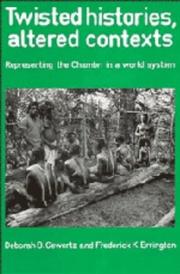| Listing 1 - 2 of 2 |
Sort by
|

ISBN: 0521395879 0521400120 1139166433 Year: 1991 Publisher: Cambridge : Cambridge University Press,
Abstract | Keywords | Export | Availability | Bookmark
 Loading...
Loading...Choose an application
- Reference Manager
- EndNote
- RefWorks (Direct export to RefWorks)
Deborah Gewertz and Frederick Errington have worked as anthropologists in Papua New Guinea for nearly two decades. In this, their second joint study of the Chambri, they consider the way those in a small-scale society, peripheral to the major centres of influence, struggle to sustain some degree of autonomy. They describe the Chambri caught up in world processes of social and cultural change, and attempt to create a 'collective biography' which conveys the intelligibility and significance of the twentieth-century experience of these Papua New Guineans whom they have come to know well. This biography consists of interlocking stories, twisted histories, commentaries and contexts about Chambri who are negotiating their objectives while entangled in systemic change and confronting Western representations of modernization and development.
Acculturation --- Chambri (Papua New Guinean people) --- Economic conditions. --- Ethnic identity. --- Social conditions. --- Chambri (Peuple de Papouasie-Nouvelle-Guinée) --- Chambri (Peuple de Papouasie-Nouvelle-Guinée) --- Social life and customs. --- Moeurs et coutumes --- Identité ethnique --- Conditions économiques --- Social Sciences --- Anthropology --- Chambri (Papua New Guinea people) --- Tshamberi (Papua New Guinean people) --- Ethnology --- Papuans --- Culture contact (Acculturation) --- Development education --- Civilization --- Culture --- Assimilation (Sociology) --- Cultural fusion

ISBN: 110711733X 1280420634 0511175779 0511016409 0511156375 0511329237 0511606125 0511048181 9780511016400 9780511175770 9780511606120 9786610420636 6610420637 052165212X 9780521652124 9780511156373 9780511048180 0521655676 9780521655675 9781280420634 9780511329234 Year: 1999 Publisher: Cambridge, U.K. ; New York : Cambridge University Press,
Abstract | Keywords | Export | Availability | Bookmark
 Loading...
Loading...Choose an application
- Reference Manager
- EndNote
- RefWorks (Direct export to RefWorks)
This accessible 1999 study of social class in contemporary Papua New Guinea deals with the new elite, its culture and its institutions, and its relationship to the broader society. The Papua New Guinea described here is not a place of exotic tribesmen, but a modernising society, shaped by global forces, and increasingly divided on class lines. The authors describes the life-style of the elite Wewak, a typical commercial centre, their golf clubs and Rotary gatherings, and bring home the ways in which differences of status are created, experienced and justified. In a country with a long tradition of egalitarianism, it has become at once possible and plausible for relatively affluent 'nationals' to present themselves in a wide range of contexts as fundamentally superior to 'bushy' people, to blame the poor for their misfortunes, and to turn their backs on their less successful relatives.
Social classes --- Class distinction --- Classes, Social --- Rank --- Caste --- Estates (Social orders) --- Social status --- Class consciousness --- Classism --- Social stratification --- Wewak (Papua New Guinea) --- Social conditions. --- Social Sciences --- Anthropology
| Listing 1 - 2 of 2 |
Sort by
|

 Search
Search Feedback
Feedback About UniCat
About UniCat  Help
Help News
News